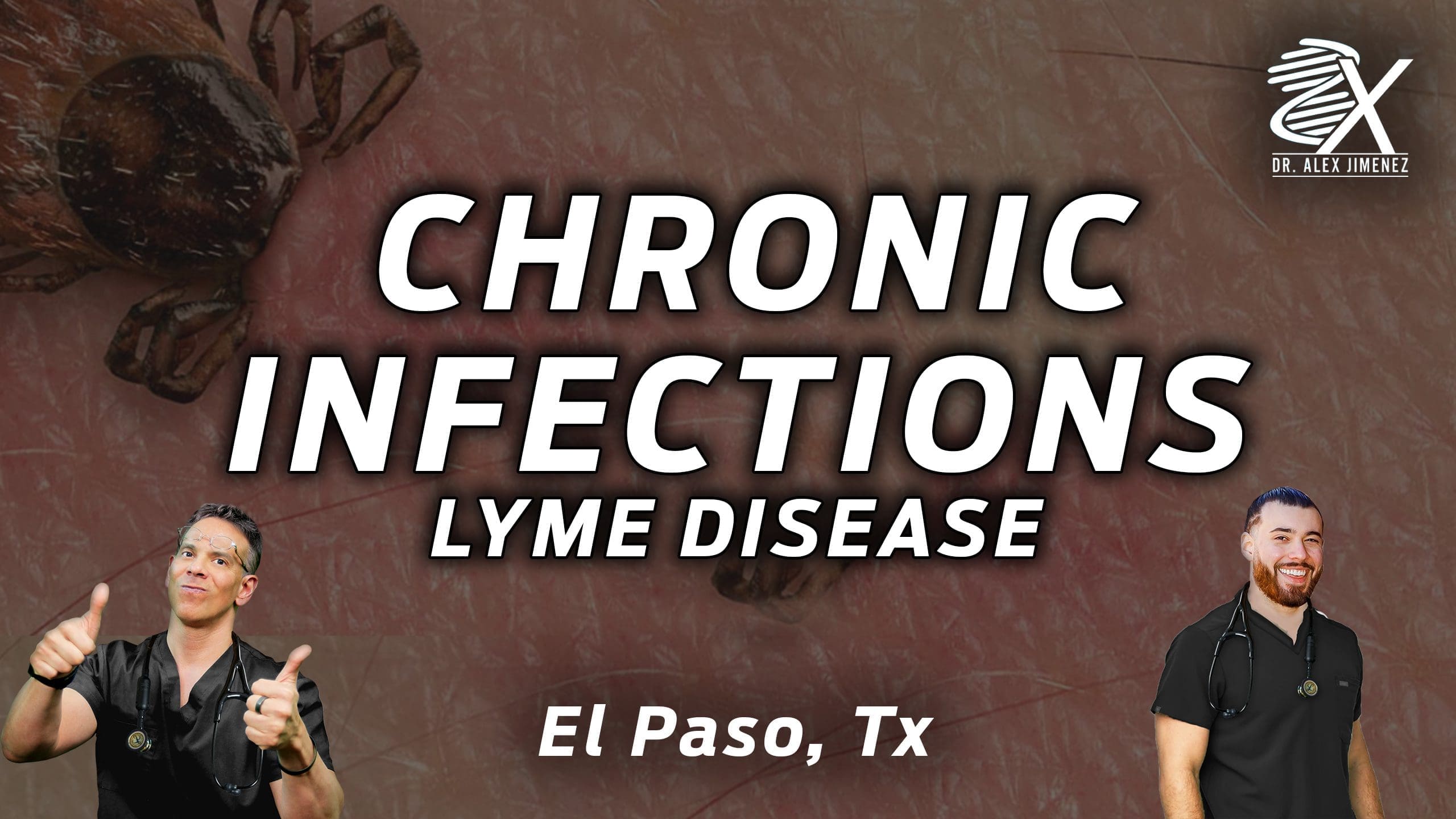
Table of Contents
Introduction
Dr. Jimenez, D.C., presents how chronic infections are associated with Lyme disease in this 3-part series. Many environmental factors often play a role in our health and wellness. In today’s presentation, we look at genes and how to answer the right questions. Part 12 looked at what Lyme disease does to the body. Part 3 looks at treatment protocols for Lyme disease. We mention our patients to certified medical providers that provide available therapy treatments for individuals suffering from chronic infections associated with Lyme disease. We encourage each patient when it is appropriate by referring them to associated medical providers based on their diagnosis or needs. We understand and accept that education is a marvelous way when asking our providers’ crucial questions at the patient’s request and acknowledgment. Dr. Alex Jimenez, D.C., uses this information as an educational service. Disclaimer
Chronic Infections
Dr. Alex Jimenez, D.C., presents: We will have an interesting, brief discussion about evidence of an atomic force micrograph of a borrelia burgdorferi biofilm. This is a talk about stealth pathology and chronic infection in general, and we are using Lyme as a backdrop, but this is far from a comprehensive course on Lyme disease. So, let’s dive in because we are going to learn a lot about stealth pathology and a lot about Lyme disease. How do you begin thinking about chronic occult infection and stealth pathology? It starts with the basic functional medicine model.
It would help if you dealt with the phenotype. You know, your genes are not your destiny. Well, your phenotype isn’t your destiny either because it’s malleable. And how do we change your phenotype by dealing with the exposome, internal exposome, lifestyle issues, air, water, food pollution, medications, environmental toxins, xenobiotics, those kinds of things? Other exposomes include internal metabolic byproducts, lipid peroxides, oxidative stress, protein addicts, inflammation, the microbiome, et cetera. And then cognitive thoughts, beliefs, fears, phobias, isolation stressors, et cetera. And these cognitive processes have profound effects on immune responses. And then, on top of that, you have to deal with the pathogen. You must understand the biology, life cycle, and genetics of the pathogen you’re dealing with. You must also understand the pathophysiology, stealth pathology, cooperation, biofilm production, and interactions with the host immune system. And it’s important to remember that we’re talking about chronic infection here, not acute infection.
Acute Infections
Dr. Alex Jimenez, D.C., presents: If your patient has an acute infection, like pneumonia or meningitis, get them on IV antibiotics immediately, and don’t wait for your functional medicine workup. So how do you even begin to think about this? Well, you start with a comprehensive physical exam and look carefully at the question, when was the last time your patient was truly well? We like to think of it like this. If wellness is a straight line at some point, it broke right at that place, right around there. This can happen several times, so it might have broken ten years ago. And they came along with this new normal, but it broke numerous times again. And so, at each of those breaks in the overall health, what happened? What were the antecedents? What were the triggers?
Mediators For Genes
Dr. Alex Jimenez, D.C., presents: What were the mediators? And then, look at a physical and nutritional exam and, again, for antecedent triggers and mediators. And then create a timeline to look for the antecedent triggers and mediators. People come with baggage. They’ve been given this diagnosis and that diagnosis. And the other diagnosis, you know, they might have seronegative, rheumatoid arthritis, they might have fibromyalgia, chronic fatigue syndrome, maybe somebody said they had Epstein-Barr virus. Whatever it is, we need to look at those diagnoses critically and do whatever’s necessary. More tests, consultations, whatever’s required to rule it in or out. And from there, we populate a matrix. And this matrix is a living document because every time a new bit of data comes in, we need to fit that into the matrix.
The functional medicine workup has a layer on the bug’s biology and pathophysiology. And here is what we call the infectious Denee disease conundrum in these five areas where these bacteria seem to be able to figure out how to evade antibiotic and antimicrobial herbs and pharmaceuticals and our immune system. And then always remember the fundamental functional medicine adage, which is, unless there is a compelling reason to do otherwise, start in the gut. So start in the gut unless there’s a compelling reason to do otherwise, and here is why. So baseline nutritional deficiencies can be caused by many different antecedences and triggers. Let’s take just one as an example. People are in autonomic dysregulation, causing fight-or-flight responses. Fight or flight shunts blood away from your gut, which means you are not digesting or absorbing efficiently.
How Do Chronic Infections Affect The Body
Dr. Alex Jimenez, D.C., presents: That means that you’re functionally malnourished. Also, you’re shunting blood away from your gall. So the gut-associated lymphoid tissue comprises 70% of your entire immune system, intimately associated with the gut; you’re shunting blood away from that. So you’re functionally immune compromised just from autonomic balance issues. So what does cause increased baseline oxidative stress, impaired immune function, and impaired mucosal defenses that result in the proliferation of some of these endogenous viruses? In middle teens, you are colonized or dormant, infected with Epstein-Barr, cytomegalovirus, and some herpes simplex viruses may bloom. That increases your susceptibility to infection. These things increase the frequency, severity, and duration of infection. And here’s where amplification loops begin. This causes exacerbations in oxidative stress in your mucosal damage.
And then sick behaviors of anorexia and so on result in these amplification loops. And now, the problem is getting bigger and bigger, and the body’s ability to solve this problem is shrinking. And that’s where functional medicine interventions are so powerful and important. And the question always comes up, “Do I have enough time? Do I have enough data, if you will, to even begin treatment?” We want to simplify functional medicine to show you how powerful it is. Let’s say assimilation is an example. We’re just going to pick four ways to intervene in assimilation. We’re going to say there’s no problem in assimilation, so we’re not going to do anything. Or there’s a mild problem. So we’re going to put them on an elimination diet; maybe there’s a more moderate problem.
Conclusion
Dr. Alex Jimenez, D.C., presents: So we’re going to add to that elimination diet, say, colostrum. And then, for a severe problem, we’re going to layer on top of that a GI-focused medical food. So this is a more complex medical food. So we have these four interventions. Now, we’re considering intervening at all the functional medicine matrix nodes. In that case, we have the, you know, the seven physiologic nodes, what we think are often overlooked, the mental, emotional, and spiritual domains of wellness, the five modifiable lifestyle factors, and so on. So you end up with about 19 and more if you’re doing labs because you’ll intervene on all those. But four to the 19th power is the number of different combinations or ways this can happen. This becomes unique in the world intervention for your patient. So never be afraid to start and do another lap around the matrix by adding more information, and think about the next step. Now, we want to talk about the quality of evidence that we find in evidence-based medicine. A 2005 research paper published by Dr. Iondas titled “Why Most Published Research Finds Are False?” The research shows an increasing concern that most current published research findings are false, as studies show that many claims are more false than true for many designs and settings. The research is more or less an accurate measure of the prevailing bias.
Disclaimer
Disclaimers
Professional Scope of Practice *
The information herein on "Chronic Infections Associated With Lyme Disease (Part 1)" is not intended to replace a one-on-one relationship with a qualified health care professional or licensed physician and is not medical advice. We encourage you to make healthcare decisions based on your research and partnership with a qualified healthcare professional.
Blog Information & Scope Discussions
Welcome to El Paso's wellness blog, where Dr. Alex Jimenez, DC, FNP-C, a board-certified Family Practice Nurse Practitioner (FNP-C) and Chiropractor (DC), presents insights on how our team is dedicated to holistic healing and personalized care. Our practice aligns with evidence-based treatment protocols inspired by integrative medicine principles, similar to those found on dralexjimenez.com, focusing on restoring health naturally for patients of all ages.
Our areas of chiropractic practice include Wellness & Nutrition, Chronic Pain, Personal Injury, Auto Accident Care, Work Injuries, Back Injury, Low Back Pain, Neck Pain, Migraine Headaches, Sports Injuries, Severe Sciatica, Scoliosis, Complex Herniated Discs, Fibromyalgia, Chronic Pain, Complex Injuries, Stress Management, Functional Medicine Treatments, and in-scope care protocols.
Our information scope is limited to chiropractic, musculoskeletal, physical medicine, wellness, contributing etiological viscerosomatic disturbances within clinical presentations, associated somato-visceral reflex clinical dynamics, subluxation complexes, sensitive health issues, and functional medicine articles, topics, and discussions.
We provide and present clinical collaboration with specialists from various disciplines. Each specialist is governed by their professional scope of practice and their jurisdiction of licensure. We use functional health & wellness protocols to treat and support care for the injuries or disorders of the musculoskeletal system.
Our videos, posts, topics, subjects, and insights cover clinical matters, issues, and topics that relate to and directly or indirectly support our clinical scope of practice.*
Our office has reasonably attempted to provide supportive citations and has identified the relevant research studies or studies supporting our posts. We provide copies of supporting research studies available to regulatory boards and the public upon request.
We understand that we cover matters that require an additional explanation of how they may assist in a particular care plan or treatment protocol; therefore, to discuss the subject matter above further, please feel free to ask Dr. Alex Jimenez, DC, APRN, FNP-BC, or contact us at 915-850-0900.
We are here to help you and your family.
Blessings
Dr. Alex Jimenez DC, MSACP, APRN, FNP-BC*, CCST, IFMCP, CFMP, ATN
email: coach@elpasofunctionalmedicine.com
Licensed as a Doctor of Chiropractic (DC) in Texas & New Mexico*
Texas DC License # TX5807
New Mexico DC License # NM-DC2182
Licensed as a Registered Nurse (RN*) in Texas & Multistate
Texas RN License # 1191402
ANCC FNP-BC: Board Certified Nurse Practitioner*
Compact Status: Multi-State License: Authorized to Practice in 40 States*
Graduate with Honors: ICHS: MSN-FNP (Family Nurse Practitioner Program)
Degree Granted. Master's in Family Practice MSN Diploma (Cum Laude)
Dr. Alex Jimenez, DC, APRN, FNP-BC*, CFMP, IFMCP, ATN, CCST
My Digital Business Card






